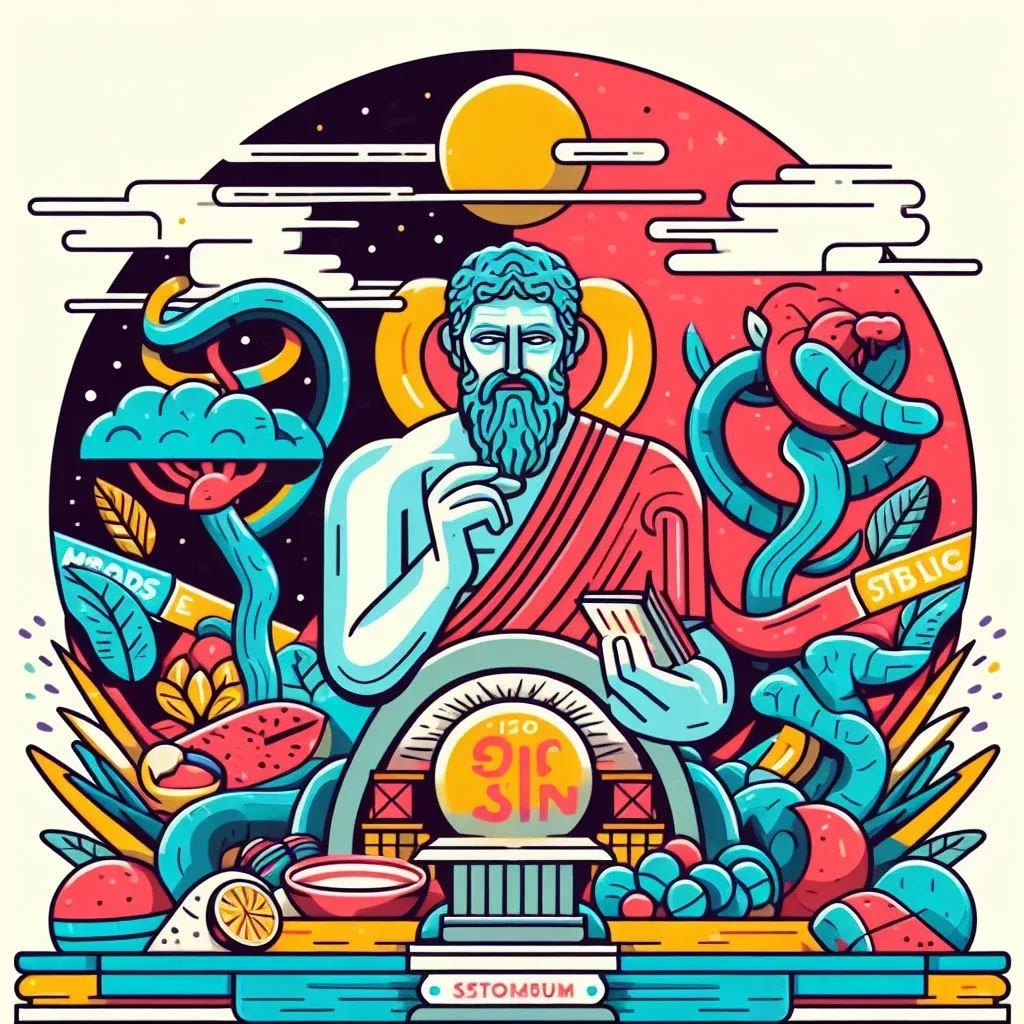Introduction: An Inquiry into Stoicism and Morality
Stoicism is an ancient philosophy whose main objective is the pursuit of virtue, self-control and emotional serenity. However, there are those who wonder whether Stoicism is in conflict with moral or religious systems and whether it is somehow considered a sin. In this article, we will explore this intriguing question and investigate the relationship between Stoicism and morality.

Stoicism at a Glance
Before we get into the question of morality, it is important to understand the fundamental principles of Stoicism:
- Virtue as Supreme Good: For the Stoics, virtue is the supreme good. Seeking wisdom, courage, justice and moderation is the path to a meaningful life.
- Emotional control: Stoics believe in internal control over emotions. This implies the ability to deal with emotions in a balanced and rational way.
- Acceptance of Impermanence: Stoicism teaches you to accept the impermanence of life and not resist inevitable changes.
Stoicism and Morality

Now, let's address the central question: is stoicism a sin?
1. Compatibility with Morality
At its core, Stoicism is compatible with moral systems. The emphasis on the pursuit of virtue, emotional control, and acceptance of impermanence can be seen as morally virtuous. Stoics seek to live just and ethical lives.
2. Moral Challenges
However, there are moral challenges when it comes to stoicism. For example, an emphasis on indifference to external circumstances can be misinterpreted as indifference to social injustices. Furthermore, Stoicism does not explicitly emphasize compassion or altruism, although this is not necessarily incompatible with the philosophy.
3. Religion and Stoicism
When it comes to religion, the relationship between Stoicism and religious beliefs can vary. Some may find Stoicism compatible with their faith, while others may see it as conflicting. Stoic philosophy is not a religion, but an approach to life.
Stoicism as a Moral Complement
One way to consider Stoicism is as a moral complement. It provides tools for self-improvement, which can be incorporated into existing moral and religious systems. The lessons of emotional control, pursuit of virtue, and acceptance can strengthen a person's morality.
Conclusion: Stoicism and Morality
Ultimately, the answer to the question “Is Stoicism a sin?” It depends on the individual perspective. Stoicism, in itself, is neither a religious nor a moral doctrine, but a philosophy that can be shaped by personal and ethical values. Many find Stoicism a valuable approach to living virtuous and ethical lives, while others may see moral challenges.

Stoicism is not, in itself, sinful, but rather an approach to life that encourages self-transformation and the pursuit of virtue. As with any philosophy or moral system, the interpretation and application of Stoicism is personal and varies from individual to individual. Therefore, the relationship between Stoicism and morality is a complex issue that deserves careful thought and consideration.
Frequently Asked Questions about “Is Stoicism a Sin?”
In this FAQ, we will address the most common questions related to the intriguing question of whether Stoicism can be considered a sin or is in conflict with moral or religious systems.

1. What is stoicism?
Stoicism is an ancient philosophy that emphasizes the pursuit of virtue, self-control, and emotional serenity as paths to a meaningful life. Its emphasis is on self-transformation and wisdom.

Enjoy a full life with Seneca coffee
Find true happiness and purpose with Seneca coffee. Discover how to live according to Stoic virtues and face life's challenges with a new perspective.
BUY NOW
2. Is Stoicism a religion?
No, Stoicism is not a religion. It is a philosophy of life that offers guidance on how to live ethically and meaningfully. It has no religious rituals or deities.
3. Is Stoicism morally virtuous?
Stoicism is morally virtuous in that it emphasizes the pursuit of virtue, self-control, and calm acceptance of circumstances. However, personal interpretation and application of these principles may vary.
4. Does Stoicism conflict with religious systems?
The relationship between Stoicism and religious systems can vary. Some may find Stoicism compatible with their religious beliefs, while others may see it as conflicting. This depends on individual beliefs and interpretation of Stoicism.
5. Does stoicism promote indifference?
Stoicism promotes indifference toward external circumstances that we cannot control. However, it does not imply indifference towards morality or justice. The emphasis is on internal control over our emotional reactions.
6. Is Stoicism a sinful approach?
Stoicism is not, in itself, sinful. It is a philosophy of life that encourages the pursuit of virtue and wisdom. Its morality depends on individual interpretation and application of principles in relation to personal beliefs.
7. Can Stoicism be compatible with religion?
Yes, Stoicism can be compatible with religion, as long as it is interpreted in a way that complements religious beliefs. Many people find Stoicism a valuable approach to improving their morality and ethics.
8. Is stoicism a personal choice?
Yes, the decision to adopt stoicism is a personal choice. Each individual is free to explore and apply the principles of Stoicism in accordance with their personal beliefs and values.
9. Is Stoicism a sin according to any specific religion?
There is no specific religion that declares stoicism a sin. The interpretation of how Stoicism relates to religious beliefs varies between different religious traditions and individuals.
In short, the question of whether Stoicism is a sin is complex and personal. Stoicism is not intrinsically sinful, but its interpretation and application depend on individual beliefs and values. Each person is free to explore and adopt Stoicism according to their own ethical and religious perspectives.




